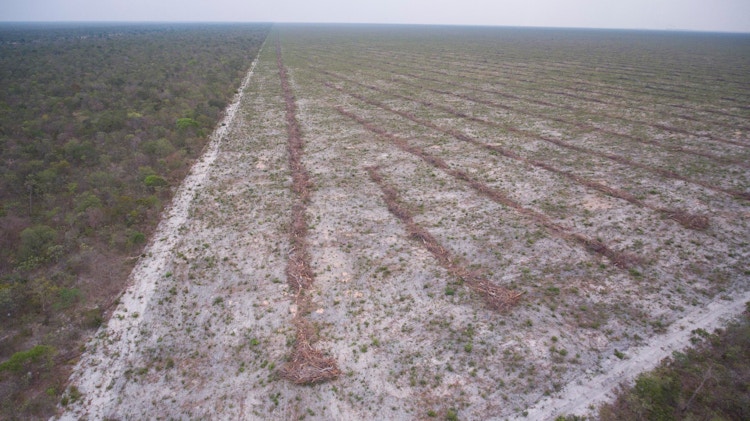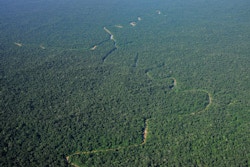Norway’s sovereign wealth fund must end soy traders’ forest destruction
The world’s largest sovereign wealth fund invests USD 116 million in the US soy trading company Bunge, which is accused of extensive deforestation in Brazil. Tropical deforestation is contrary to the Norwegian fund’s requirements for companies it chooses to invest in, and Rainforest Foundation Norway expects the fund to demand that Bunge halt all deforestation.

New areas being cleared for agriculture in Brazil. The photograph is from the report "Ultimate Mystery Meat", which was published on Saturday 25 February.
02 March 2017
Rainforest Foundation Norway (RFN) has investigated the
investment portfolio for 2016 of Norway’s Government Pension Fund Global (GPFG),
presented at the launch of the GPFG's annual report on 28 February. The
investigation has disclosed investments just shy of USD 17 billion in sectors with
a high risk of rainforest destruction. This is an increase of 20 percent on the
previous year.
“It’s pretty remarkable that the fund has increased its investments in the Brazilian meat industry by a whopping 285 percent, to USD 146 million, particularly since cattle ranching is the main cause of deforestation in the Amazon”, says senior adviser Vemund Olsen in Rainforest Foundation Norway’s policy and campaign department.
USD 116 million invested in major US deforester
RFN’s investigation reveals that the sovereign wealth fund invests USD 116 million in the US soy trader Bunge. The new report "Ultimate Mystery Meat” produced by Rainforest Foundation Norway and the American organization Mighty Earth links Bunge to systematic deforestation.
The report was published on 25 February, and formed the basis for a major article in the New York Times that same day about how deforestation in the Amazon has come roaring back.
In preparing the report, we analyzed satellite images dating
several years back, surveyed supply chains and conducted interviews with local
soybean farmers. The grim conclusion is that between 2011 and 2015, a total of just
over 787,000 hectares Brazilian forests were destroyed in areas where Bunge and
Cargill - another American soy trader under scrutiny in the report - are
present.
Bunge's name is linked to the lion’s share of this devastation: 567,466
hectares of forest was destroyed in that five-year period, an area larger than
the entire US state of Delaware.

One of Bunge's facilities in Brazil, where soy from a large number of soy farmers is collected before being distributed all over the world.
Although it can’t be conclusively proven that all this
devastation is caused by soy production both Bunge and Cargill are drawing flak
for not taking action to prevent it.
“The Norwegian fund must demand that Bunge halt the devastation”
Rainforest Foundation Norway now holds high hopes that the world's largest sovereign wealth fund will put the screws on one of them: Bunge. The Norwegian fund is a major investor in Bunge, at close to USD 116 million.
The Norwegian sovereign wealth fund has previously made it
clear that companies that destroy tropical forests are in danger of being excluded
from the fund's portfolio. The most famous example of this came in 2013, when it emerged that the
fund had divested from 23 palm oil companies the previous year - including the world's biggest palm oil company, Wilmar. The company responded by making
a formal commitment to stop destroying rainforests.
“We expect the Norwegian sovereign wealth fund to send a
clear message to Bunge that the deforestation revealed in our report and the
New York Times article is unacceptable. As one of the world’s largest investors
the fund possesses considerable financial muscle and power to influence
companies. We have seen how the palm oil industry in Indonesia has taken
exclusions and threats of exclusion seriously. We now hope the fund can lean on
Bunge to take appropriate action”, says senior adviser Vemund Olsen in the NGO Rainforest
Foundation Norway.
Norwegian parliament has set strict requirements to avoid deforestation
Such pressure would be entirely in line with what the Norwegian parliament expects the sovereign wealth fund to do with regards to companies found to fall foul of official Norwegian standards. The fund's expectations document on climate change strategy imposes strict requirements on companies in the portfolio to avoid contributing to tropical deforestation.
The requirements are that the companies in the fund’s portfolio must not only adopt their own strategies for avoiding deforestation but that they must also work to eliminate deforestation from their supply chains, including third party suppliers. Those same companies are also required to report to the fund on their work in this regard.
“The revelations in the report and the recent major piece in New York Times make it fairly obvious that Bunge does not meet the Norwegian sovereign wealth fund's expectations. We expect the fund to show that it takes its sustainability commitments seriously by demanding a termination of the deforestation Bunge causes”, says Olsen.
Report and campaign to hold Burger King accountable
As for Cargill, the Norwegian sovereign wealth fund owns only corporate bonds in the company and therefore has few opportunities to exert direct influence. Fortunately, there are other ways to turn up the heat on Cargill. The title of the report "Ultimate Mystery Meat" alludes to the meat used by the international burger giant Burger King. Soy from both Cargill and Bunge are in all likelihood used in feed for animals used in hamburgers, bacon and nuggets at Burger King restaurants.

The field team behind the report "Ultimate Mystery Meat" documented several instances of forest having been set ablaze.
A direct link can not be established because Burger King fails to be open about its supply chains. Accusations of contributing to deforestation have fallen on deaf ears with the international burger giant, which does not set any requirements for their supply chains to avoid deforestation.
This constitutes yet another violation of the sovereign wealth fund's expectations document on climate, as the fund invests some USD 53 million in Restaurant Brands International (RBI), which owns Burger King.
“US shareholders of RBI have filed a shareholder proposal
to get the company to commit to avoid deforestation. The Norwegian sovereign
wealth fund should put its considerable weight behind this shareholder proposal
and demand that RBI and Burger King clean up their act”, says Olsen.
Rainforest Foundation Norway and Mighty Earth have launched an international campaign to push Burger King to commit to avoiding rainforest destruction. If Burger King requires companies through their entire supply chain to avoid deforestation it may compel Cargill and Bunge to finally put an end to deforestation in South America.
Take action! Tell Burger King to Stop Destroying Rainforests
by signing our petition against the King of deforestation.

